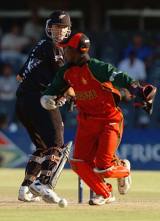Where is the line in the sand?
Is it time for New Zealand Cricket to take a moral stand rather than a financial one?
Martin Williamson
07-Jul-2005
|
|

|
Last weekend, across much of the world, people's attention has been focused on Africa, and that will continue with this week's G8 summit. What has been for decades a largely forgotten and exploited backwater has now been thrust into the spotlight. And Zimbabwe is repeatedly flagged as an example of the continent's worst excesses.
Since England's trip, Robert Mugabe has escalated his policy of crushing opposition by means of violence and starvation. The UN estimates that four million people - more than a third of the population - face starvation. Up to 4000 people are dying of AIDS and malnutrition each week. And yet two decades ago Zimbabwe produced so much food that it not only fed its own people, but also exported considerable quantities of food to its neighbours.
Feedback to Cricinfo shows that in many people's minds, concerns over tours of Zimbabwe are borne out of a colonial/racist mindset. There is no doubting that some of Zimbabwe's problems are a legacy of colonialism, and that Britain's role in its past is far from impressive. But that is history. What is happening today is nothing to do with colonialism, nor with racism (fewer than 20,000, or 0.5% of the population are white). It is genocide. Oppose the government and you are in danger - of starvation, of having your home demolished, of physical violence, of death. When challenged, Mugabe repeatedly and conveniently hides behind the colonial/racism card, but look behind the rhetoric and the reality is that almost all the victims are black.
Another argument peddled is that sport and politics don't mix. Such a claim is idealistic and more often than not a convenient excuse to look away. In the modern world, sport and politics are inexorably linked - just look at apartheid South Africa or the Olympics. The 1976 Montreal games were badly hit by the withdrawal of a number of African nations over the inclusion of New Zealand, who they wanted kicked out because of their sporting links with South Africa.
Sanctions, however symbolic, can have an effect. Nelson Mandela wrote of their effectiveness when he said that "every effort to isolate South Africa adds strength to our struggle."
Claims that the New Zealand players will not be used as political pawns while in Zimbabwe are right in that they will not be directly used. While none will be photographed having a chummy post-match drink with Mugabe, the Zimbabwe Cricket Union's patron, their presence in the country gives the regime a veneer of respectability and sends a message to the world that perhaps things can't be all that bad after all. But the matches will take place a mile or so from some of the worst excesses.
|
|

|
Martin Snedden, the current NZC chief executive, has refused to entertain any suggestions that the tour be called off, and reports indicate he didn't even raise the issue at the recent ICC meeting in London. "He has to do what he is doing," noted Rod Donald, the leader of New Zealand's Green party, "though I probably wish he wasn't doing it so enthusiastically." Snedden and his colleagues cite the financial penalties and possible isolation of New Zealand cricket were they to stay away as the reason for their stand. And fears that NZC's desire to host or co-host the 2011 World Cup might also be a factor.
But if it comes to the crunch, would the ICC actually fine NZC if it refused to go? If it did, then it would risk international condemnation from a much wider audience than the cricket world. It would, at best, be seen as out of touch and insular. One wonders what it would do in these more commercial times if faced with apartheid. There was never an issue over player safety, so presumably tours could proceed?
The NZ government, like their UK counterparts, have been strong on rhetoric, but unlike the UK, they appear willing to back up their words with actions and look likely to ban Zimbabwe's reciprocal tour later this year. They could make NZC's decision easier - or harder, depending how you look at it - by offering to underwrite any fine if the ICC did get heavy. While a few million dollars is crucial to the board, it is peanuts to the government, and if, as seems the case, public opinion is behind taking a stand on Zimbabwe, it might even win them a few votes, the one currency politicians really understand.
It's a cruel world and Zimbabwe is just one of many countries with a government persecuting its own people. But at some time, someone has to draw a line in the sand and say "no more". New Zealand Cricket has that chance, but faced with dollars or a tough moral decision, and, to be fair, precious little support from many inside the cricketing world's hierarchy, the cash, as always, appears to have won out.
Martin Williamson is managing editor of Cricinfo